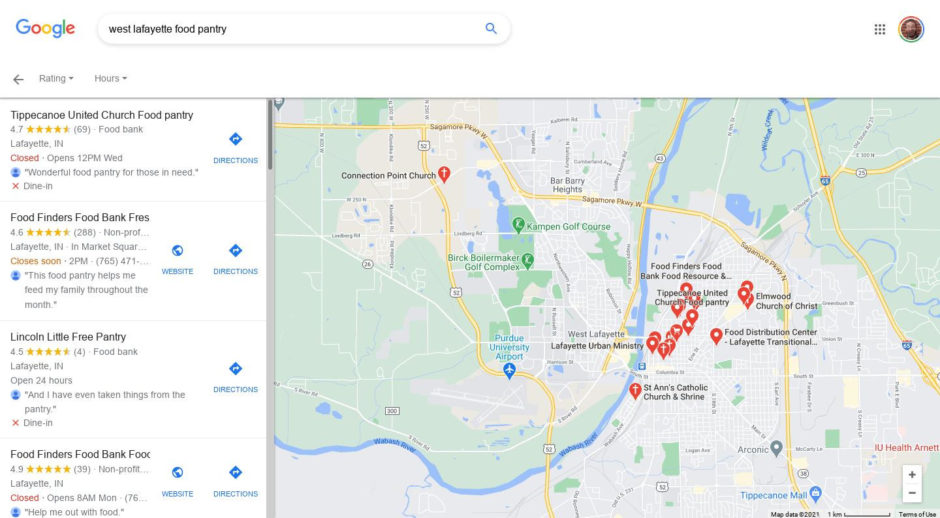Searching Google: West Lafayette Food Pantry

This morning, we awoke to a snow plow barrelling down a street.
“It must have snowed last night.”
Hieronymus and I drank some water and I heated up a cup of yesterday’s coffee before launching into my morning routine of checking my personal e-mail.
I saw a notification about this post on Nextdoor:
Having attended the November and December City Council meetings, I recalled the discussion around the communication component of Ordinance 32-19, An Ordinance For The Removal Of Vehicles, Trailers, And/Or Other Equipment Parked On The Street During The Clearing Of Snow On Emergency Snow Routes. Here are the minutes from the November 6th, 2019 and the December 9th, 2019 meeting that contained the on-record remarks.
If Nixle is the only method of communication, the majority of the community will be left out. To that end, I wrote Mayor Dennis, Street Commissioner Anderson, and Tonya Vanaman (who was listed on the Snow Plow page for the City), the City Council, and the Clerk (for the records request portion). Mutual knowledge is key to creating change.
Good morning Mayor Dennis and Street Commissioner Anderson,
How are you and yours today? I hope you had a good start to the new year.
I still haven’t received any correspondence (my e-mail was sent December 4th) on the Police or Financial Transparency portal. Have you all given up on that effort?
I also wrote on Twitter and tagged a few councilors as well. Can someone from the City, appointed or elected, share the process/policy that clarifies the declaration of the snow emergency will be published electronically section of Ordinance 32-19? I have attached a Public Records Request in anticipation of one being requested.
I remember that there was a lively discussion about the new Snow Emergency ordinance updates, in particular, how would the Public be notified when such an event occurred. The ordinance states that they will be published electronically.
Whenever there is an accumulation of two inches or more of snow and/or ice, a snow emergency will be declared.All vehicles, trailers, and/or equipment parked on all emergency snow routes in the area bounded,as described in this subsection,shall be removed by the owner until the road has been cleared. A declaration of the snow emergency will be published electronically. The emergency snow routes are as follows:
At present, I have only seen a notification from a neighbor on Nextdoor. I do not use Nixle on my phone for a variety of reasons. What other channels did the City use to make sure the community was aware of this declaration?
The City’s website, Twitter, and Facebook pages are silent. As a constituent, I am happy to help volunteer with designing this process. Please let me know.
Thank you again for all that you do and the service you provide our community.
May you and yours be safe, well, and at peace.
Take care,
–Zachary Baiel
We have all heard public officials (elected or appointed) state that they are for transparency.
We have heard candidates for various offices, at all levels of government, claim they want to make government more transparent.
Yet. When these officials and candidates assume their positions, we rarely see any meaningful changes in the policies, procedures, and actions that would constitute increased transparency.
All talk and no action equals bullshit.
Another dimension to this idea are the pro-transparency candidates who lose their respective elections, but then sit on the sidelines, usually in silence, and do nothing that promotes greater transparency of the offices they were running for.
Again. All talk and no action equals bullshit.
In the #opengov community, there is consistent dialogue around the idea of proactive transparency. That is, a public entity running ahead of the Open Door Law (ODL), Access to Public Records Act (APRA), and other similar statutes in Indiana Code that govern the transparency of public entities (which is another area of confusion, which we can explore in a future essay).
Many others, and myself, hear from officials, “But we are following Indiana Code.” or “Indiana Code does not state we need to allow for public comment.” or “Indiana Code doesn’t mandate that meetings are recorded.” or another such excuse.
While although technically correct, this doesn’t mean that offices or officials cannot go beyond the lowest common denominator for transparency and accountability.
An idea I have been advocating for is good governance; ensuring the Public understands the why and the how behind the decisions made in their name.
Some small, yet, impactful changes that can be made to increase transparency if they are not already in practice today: